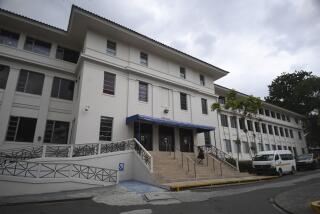Landmark Bosnia Rape Camps Trial Begins
- Share via
THE HAGUE — The Yugoslav war crimes tribunal convened a landmark trial Monday against three Serbs charged with running camps during the Bosnian war where Muslim women and girls were beaten, gang-raped and forced to bear Serbian babies.
Prosecutors said at least 10 witnesses will testify against Radomir Kovac, Dragoljub Kunarac and Zoran Vukovic, who face up to 50 counts of rape, torture, enslavement and outrages upon personal dignity.
“This is a case about the women and girls, some as young as 12 or 15 years old, who endured unimaginable horrors as their worlds around them collapsed,” said Canadian prosecutor Dirk Ryneveld.
The defendants, who have pleaded innocent to the charges, face a maximum life sentence if convicted.
The trial marks the first time an international court will hear a case about camps set up specifically to rape women. It is part of an attempt by U.N. prosecutors to make wartime sexual assault one of the most grievous and punishable crimes under international law.
The number of alleged rapes that occurred during the summer of 1992 in the southeastern Bosnian city of Foca was so high that prosecutors had to prepare charts to help present their case.
Prosecutors say many victims suffered permanent gynecological harm in addition to the psychological torment that follows a sexual assault.
The United Nations’ International Criminal Tribunal for the Former Yugoslavia in The Hague has already handed down sentences of up to 45 years to 14 defendants from all sides of the 1992-95 war in Bosnia-Herzegovina.
However, the Foca case is the first trial in which all the charges are sex crimes and in which rape is being prosecuted as a crime against humanity--as a systematic attack on a civilian group.
That presents prosecutors with an added burden of proving that the rapes were the product of a coordinated scheme, said Kelly Dawn Askin, a gender-crimes expert.
“You’ve got to establish that the sexual assaults constituted a widespread systematic attack, and that might be hard with a series of isolated incidents,” she said.
However, the trial follows a string of rulings at the Yugoslav tribunal and its counterpart for the 1994 Rwandan genocide that have demonstrated the courts are receptive to punishing gender-based crimes.
The defendants sat in stony silence as they followed the proceedings. Kunarac, a Bosnian Serb Army commander and the key defendant, occasionally tapped the keyboard of a notebook computer.
The three-judge panel hearing the case is led by Florence Mumba of Zambia, whose involvement in a U.N. commission on women’s rights is the focus of a defense appeal in an earlier rape trial that ended with the conviction of a Bosnian Croat.
Ryneveld reminded judges of the earlier rape trial of Bosnian Croat Anto Furundzija, which recognized that recollections of “victims who have suffered traumatic experiences are not necessarily unreliable.”
More to Read
Sign up for Essential California
The most important California stories and recommendations in your inbox every morning.
You may occasionally receive promotional content from the Los Angeles Times.













